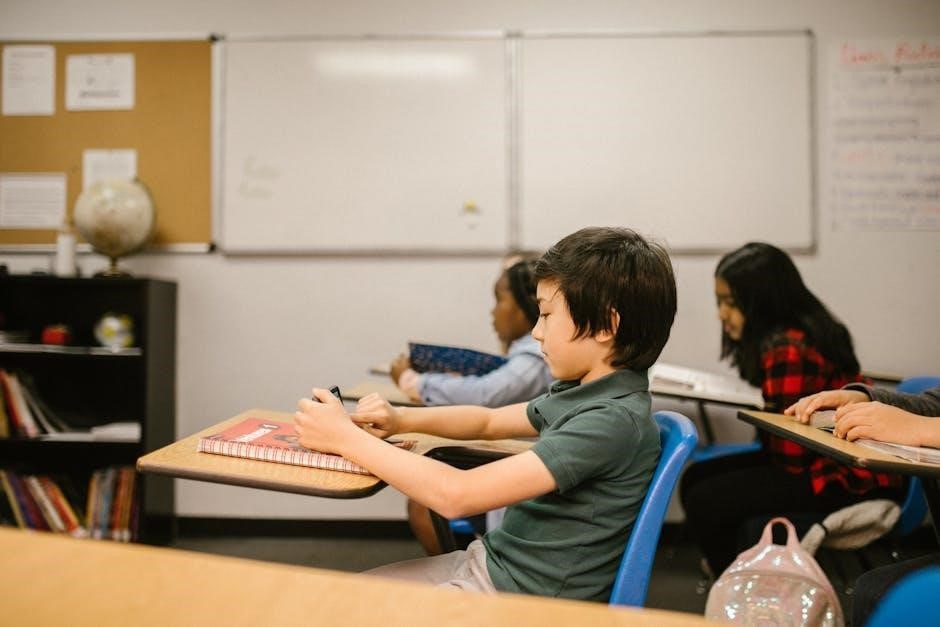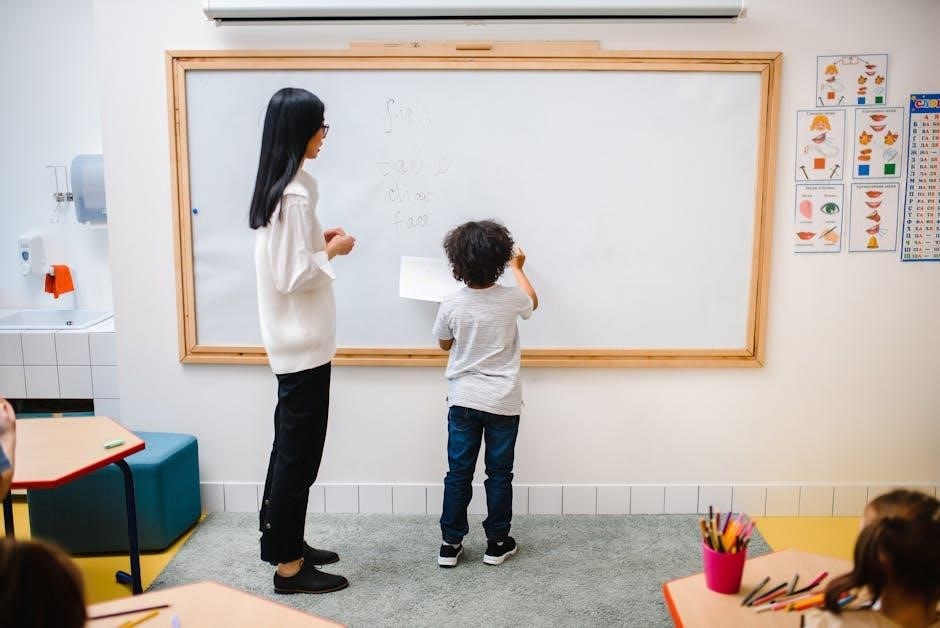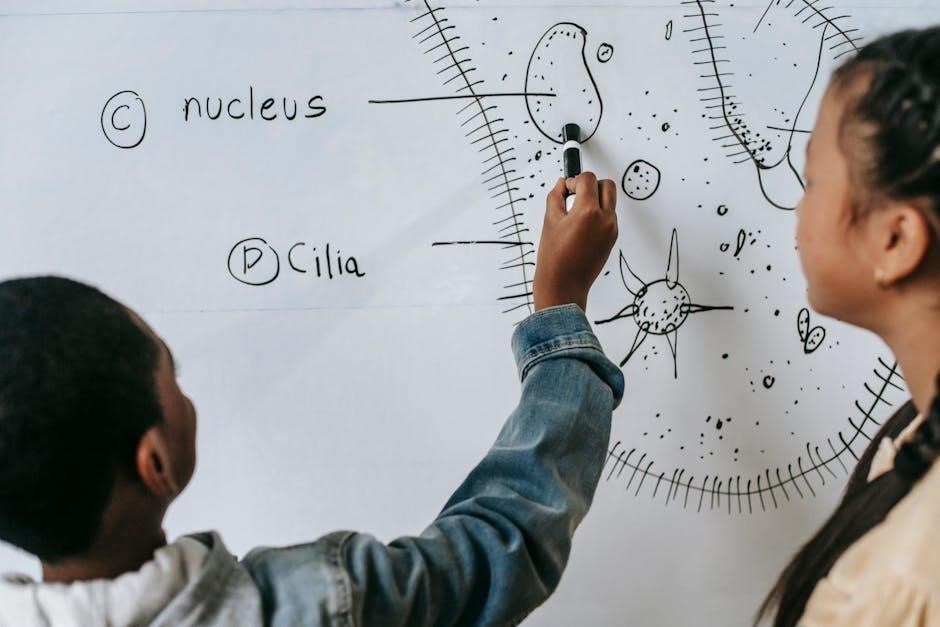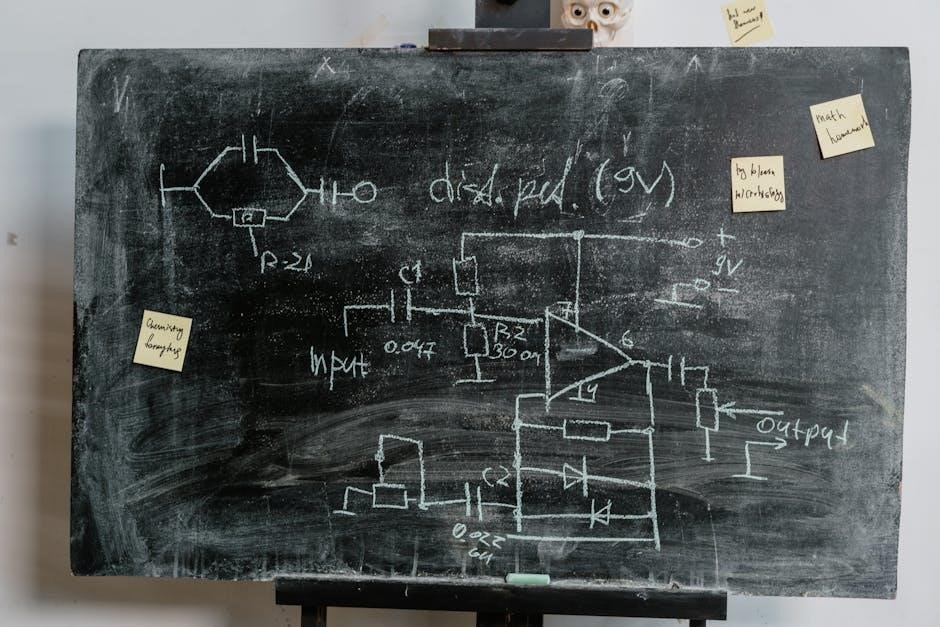Specialized Academic Instruction is a strategy offering personalized learning experiences tailored to individual needs, leveraging subject expertise and technology to enhance engagement and address diverse learning challenges effectively.
Defining Specialized Academic Instruction
Specialized Academic Instruction (SAI) refers to tailored educational strategies designed to meet individual student needs. It involves personalized learning plans, often integrating subject matter expertise and technology. SAI focuses on addressing diverse learning challenges through structured, collaborative approaches between educators and specialists. This method ensures targeted support, fostering academic growth and skill development in specific areas, aligning with each student’s unique requirements and goals effectively.
The Importance of Tailored Learning Experiences
Tailored learning experiences are essential as they address diverse student needs, fostering academic success and engagement. By customizing instruction, educators can accommodate different learning styles, paces, and challenges, ensuring each student receives relevant support. This approach enhances understanding, motivation, and skill development, preparing students for future academic and professional pursuits while promoting equity and inclusion in education.

Key Characteristics of Specialized Academic Instruction
Specialized Academic Instruction emphasizes personalized learning plans, subject matter expertise, and technology integration to meet diverse student needs, ensuring targeted support and fostering academic growth effectively.
Personalized Learning Plans
Personalized Learning Plans are tailored to individual student needs, incorporating specific academic goals and learning strategies. By using search techniques like Boolean operators, educators can identify relevant resources, ensuring plans are unique and effective. These plans often combine keywords with AND to narrow focus, exclude irrelevant content with NOT, and broaden scope with OR, creating a customized approach that enhances learning outcomes and student engagement effectively.
Subject Matter Expertise
Subject Matter Expertise involves instructors with deep knowledge in specific academic areas, enabling them to deliver precise and relevant instruction. By employing advanced search techniques, experts can quickly locate accurate information, ensuring lessons are up-to-date and aligned with curriculum goals. This specialized knowledge fosters a richer learning environment, enhancing students’ understanding and engagement through authoritative guidance and tailored explanations.
Technology Integration
Technology Integration enhances specialized academic instruction by incorporating digital tools and platforms. Educators use online resources, interactive simulations, and data analytics to create dynamic learning experiences. Advanced search techniques, such as Boolean operators and phrase searching, enable quick access to relevant materials, ensuring lessons are engaging and aligned with curriculum goals. This fosters a more interactive and data-driven approach to teaching and learning.

Benefits of Specialized Academic Instruction
Specialized Academic Instruction fosters improved academic performance, enhances student engagement, and prepares learners for specialized careers by providing tailored, expertise-driven, and technology-supported learning experiences.
Improved Academic Performance
Specialized Academic Instruction significantly enhances academic performance by providing tailored learning strategies and targeted resources. By using specific search techniques and Boolean operators, students can access relevant materials, leading to better grades and a deeper understanding of complex concepts. Personalized learning plans and expert guidance ensure students grasp challenging material effectively, preparing them for future academic and professional challenges.
Enhanced Student Engagement
Specialized Academic Instruction fosters enhanced student engagement through interactive tools and personalized learning experiences. By leveraging technology and tailored resources, students connect with material on a deeper level, fostering curiosity and motivation. Engaging strategies, such as real-world applications and collaborative activities, create a dynamic learning environment, ensuring students remain focused and actively participate in their academic journey.
Preparation for Specialized Careers
Specialized Academic Instruction equips students with skills tailored to specific career demands, fostering technical proficiency and problem-solving abilities. By integrating real-world applications and industry-specific knowledge, students gain practical insights, preparing them for roles requiring specialized expertise. This targeted approach ensures learners are adaptable and confident, ready to excel in their chosen fields with a strong foundation for lifelong professional growth and innovation.

Implementation Strategies
Effective implementation involves curriculum development, teacher training, and robust assessment strategies, ensuring alignment with learning goals and fostering continuous improvement in specialized academic instruction programs.
Curriculum Development
Curriculum development in specialized academic instruction involves creating tailored educational frameworks that align with specific learning objectives. It requires collaboration between educators and subject matter experts to design engaging, relevant content. Incorporating technology and real-world applications ensures the curriculum remains contemporary and meaningful. Continuous updates and assessments are essential to maintain effectiveness and adapt to evolving educational needs and standards.
Teacher Training and Support
Teacher training and support are crucial for effectively delivering specialized academic instruction. Professional development programs enhance educators’ skills in personalized instruction and technology integration. Ongoing support ensures teachers stay updated on best practices, fostering collaborative environments and continuous improvement. Access to resources and feedback mechanisms further empowers educators to meet diverse student needs and achieve instructional goals successfully.
Assessment and Feedback Mechanisms
Effective assessment and feedback mechanisms are essential for monitoring student progress in specialized academic instruction. Regular evaluations help identify strengths and areas needing improvement. Immediate, constructive feedback guides students toward better understanding and skill mastery. Technology-enhanced tools enable data-driven insights, fostering personalized learning and continuous improvement in educational outcomes.
Role of Technology in Specialized Instruction
Technology enhances specialized instruction by providing online platforms, interactive tools, and data-driven insights, fostering personalized learning experiences and improving student outcomes through innovative educational resources and real-time feedback.
Online Learning Platforms
Online learning platforms are integral to specialized academic instruction, providing flexible access to tailored resources and interactive tools. They enable real-time collaboration and personalized learning experiences, fostering engagement. These platforms support diverse learning needs by offering multimedia content and adaptive assessments. Educators can track progress and adjust instruction, ensuring students meet their goals. Online platforms bridge technology and education, creating inclusive and effective learning environments for all students.
Interactive Tools and Resources
Interactive tools and resources enrich specialized academic instruction by engaging students through hands-on activities and real-time feedback. These tools, such as simulations, quizzes, and multimedia content, cater to diverse learning styles. They encourage active participation, deepen understanding, and enhance retention. Educators can customize these resources to meet individual needs, fostering a dynamic and inclusive learning environment that supports academic success and student engagement.
Data-Driven Instruction
Data-driven instruction uses assessments and analytics to inform teaching strategies, ensuring personalized learning experiences. By analyzing student performance data, educators identify learning gaps and tailor instruction to meet specific needs. Technology facilitates real-time tracking, enabling timely interventions and adaptive resources. This approach enhances academic outcomes by aligning instruction with measurable goals, fostering continuous improvement and student success through evidence-based practices.

Challenges and Considerations
Specialized academic instruction faces challenges such as resource allocation, student accessibility, and continuous improvement needs. Balancing personalized learning with standardized frameworks requires strategic planning and adaptability to ensure equitable education for all.
Resource Allocation
Resource allocation in specialized academic instruction involves distributing financial, technological, and human resources effectively to support tailored learning experiences. Ensuring equitable access to personalized tools and expert instructors is critical. Budget constraints, varying student needs, and infrastructure limitations pose challenges. Strategic planning is essential to maximize resource impact and foster an inclusive educational environment. Continuous evaluation of resource distribution ensures alignment with program goals and student outcomes.
Student Accessibility
Student accessibility in specialized academic instruction focuses on ensuring all learners can engage with tailored programs. This includes providing assistive technologies, adaptable learning materials, and accommodations for diverse needs. Accessibility barriers, such as physical or cognitive challenges, are addressed through personalized plans and inclusive design. Ensuring equitable access fosters an environment where every student can thrive and reach their academic potential effectively.
Continuous Improvement
Continuous improvement in specialized academic instruction involves ongoing data analysis, teacher collaboration, and adaptive learning technologies. By monitoring student progress and incorporating feedback, educators refine strategies to enhance outcomes. This iterative process ensures instruction remains aligned with student needs, fostering a culture of growth and innovation. Regular assessments and technology integration enable tailored adjustments, promoting long-term success and academic excellence for all learners.
Real-World Applications and Examples
Specialized academic instruction is evident in STEM education through project-based learning, language immersion programs, and vocational training, providing practical skills and cultural integration for diverse learners globally.
Case Studies in STEM Education
Specialized academic instruction in STEM fields often involves hands-on projects, such as robotics competitions or coding workshops, fostering problem-solving skills. For example, schools using tailored STEM curricula report higher student engagement and improved test scores. These programs emphasize real-world applications, encouraging collaboration and innovation among learners, preparing them for future careers in science, technology, engineering, and mathematics.
Specialized Instruction in the Arts
Specialized instruction in the arts focuses on personalized learning experiences, enabling students to explore creative expression. Programs often combine visual arts, music, and theater, fostering creativity and critical thinking. Expert instructors guide students in refining techniques and understanding cultural contexts. Technology, such as digital art tools, enhances learning. This approach cultivates innovation, self-confidence, and a deeper appreciation for artistic expression, preparing students for careers in creative fields or lifelong enrichment.
Language and Cultural Immersion Programs
Language and cultural immersion programs provide tailored learning experiences, helping students master languages while understanding associated cultures. These programs often integrate interactive tools, real-world applications, and cultural activities to enhance engagement. Technology, such as language learning apps, supports personalized practice. Immersion fosters cultural awareness, improving communication skills and adaptability. Such programs prepare students for global interactions, fostering linguistic proficiency and cultural competence in diverse settings.
Future Directions in Specialized Academic Instruction
Future directions include integrating emerging technologies, fostering global collaboration, and leveraging real-time data for personalized learning. Innovations like AI and VR will redefine education, enhancing accessibility and engagement.
Emerging Technologies
Emerging technologies like AI, VR, and gamification are transforming specialized academic instruction. These tools create immersive, interactive learning environments, enabling real-time feedback and personalized experiences. AI adapts content to individual needs, while VR simulates real-world scenarios, enhancing engagement and understanding. Gamification introduces competitive elements, motivating students to achieve more. Together, these technologies revolutionize education, making it more accessible, effective, and tailored to diverse learning styles and preferences.
Global Collaboration Opportunities
Specialized academic instruction is enriched through global collaboration, enabling students to engage with peers worldwide. Online platforms facilitate shared learning projects and cultural exchanges, fostering diverse perspectives. Educators can access international resources and best practices, while students gain global competencies. This interconnected approach breaks down geographical barriers, promoting inclusive and enriched learning experiences that prepare students for an increasingly interconnected world.
Evolution of Teaching Methods
Teaching methods in specialized academic instruction have evolved significantly, integrating technology and data-driven approaches. Personalized learning plans now incorporate real-time feedback and adaptive tools, enabling dynamic adjustments. Interactive resources and multimedia enhance engagement, while collaborative platforms foster student interaction. These advancements ensure instruction is more tailored, effective, and aligned with modern learning needs, preparing students for future challenges and opportunities.
